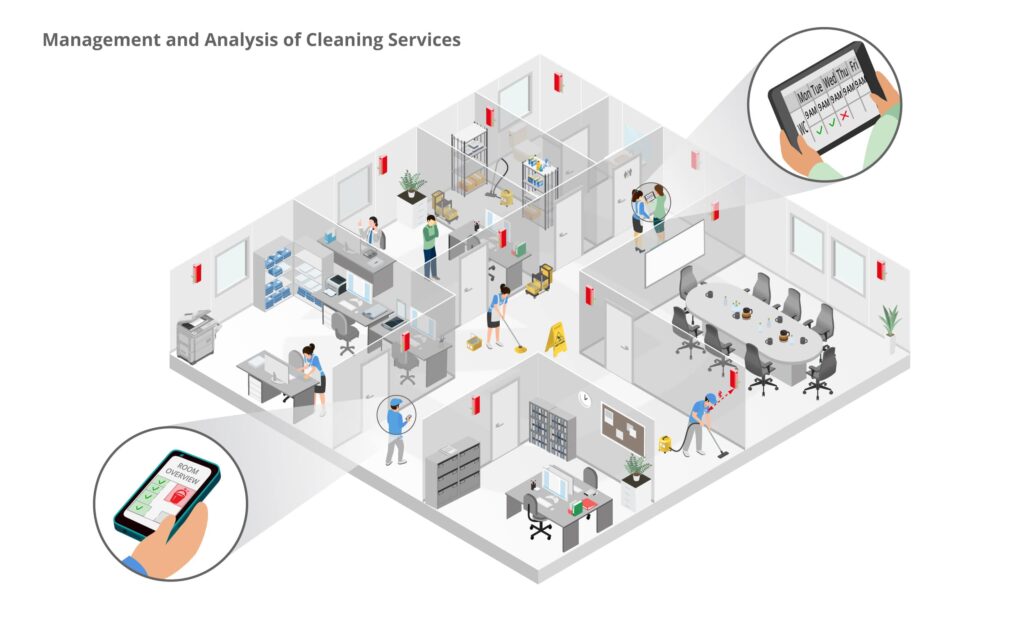A tracking system allows determining whether a cleaning contractor’s performance meets the client’s expectations and requirements.
AT A GLANCE
- 2D/3D building maps
- overview of tasks and rooms to be cleaned
- real-time localization of cleaning staff and equipment
- optimized cleaning plan based on actual use of space
PROBLEM DEFINITION
For companies, cleaning costs are one of their largest expense items. That is why it is very important for them to know if they are getting the best value or if cleaning services can be optimized. Especially when there are multiple workers cleaning a large facility, it becomes difficult to manage and monitor their actions throughout the day. Do they take unnecessary stops or unwanted long routes, causing unnecessary delays and lowering the productivity of the cleaning team as a whole? Are the workers using the correct cleaning products and equipment for the different areas to clean?
Furthermore, the demand-oriented cleaning of buildings represents a great challenge. The individual rooms are frequented very differently during the week / year, which means that the necessary cleaning intervals vary accordingly. If there was meaningful information about the respective user frequency, operators and cleaning service providers would be able to derive an efficient cleaning plan.
SOLUTION
By implementing a beacon-based, demand-driven tracking system, the locations of the individual cleaners and (if required) the cleaning equipment can be tracked in real time. The system enables tracing the routes the workers have taken and assessing the time they have spent working on different rooms, which makes it possible to gauge their performance. If there are several workers with multiple tasks scheduled for the day, it can be easily tracked whether they are maintaining their work schedule as planned. At any time, customized reports can be retrieved in a mobile or browser application. Cleaning staff can use an app to check which tasks are scheduled for the day and which room needs to be cleaned next.
Taking into account the actual utilization of the rooms helps deriving an efficient cleaning plan and thus optimizing workflows. Using analysis reports allows to identify weak spots and develop strategies to eliminate them.
TECHNICAL IMPLEMENTATION
infsoft Locator Nodes are installed throughout the building. Cleaning staff and material are equipped with a beacon in form of an ID card and a sticker respectively. The Locator Nodes receive Bluetooth signals from the beacons and transfer the data to the infsoft LocAware platform®, where it is processed in real time and the positions are displayed on a map. Based on the setup of checkpoints and time frames, the system provides a view of the time spent by each individual cleaner at various rooms and shows if defined time schedules are not met.
In order to create even more efficient cleaning plans, the tracking system can be based on actual utilization data. There are several possibilities to put such a demand-based cleaning into practice. If you do not want to make use of a tracking system, the data can be retrieved solely from information maintained in the company’s calendar and via Employee Self Service (ESS), where employees can enter their vacation periods etc. Another possibility is to accurately track person flows and the frequency of visits to the individual rooms via a locating system based on Bluetooth Low Energy or Wi-Fi (tracking beacons or mobile devices) or infrared thermopile sensors (person detection via thermal image).
Individually customizable reports allow for quick assessment of employee work history and performance. Historical data can be called up, evaluated and compared with real-time data at any time.







